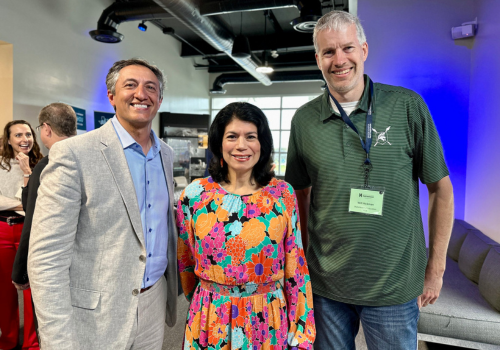Legislative Session Update: Week 20
Published Jun 03, 2019 by Taylor Landin
During the 86th Legislative Session, the Partnership provides a weekly update on our top executive priorities and other newsworthy items from Austin.
Texans will likely remember the 86th Legislative Session, which adjourned on May 27th, for the passage of three landmark pieces of legislation. First, a school finance bill that increases the state’s share of public education funding and includes transformational reform provisions that will positively impact students across Texas. Second, a property tax bill that places limits on the amount a local jurisdiction can raise its tax rate without triggering a rollback election. Finally, flood resilience legislation that vests the state in flood mitigation and planning to ensure Texas is more resilient in the face of future severe weather events.
Most agree this session was also characterized by strong leadership from Governor Greg Abbott, Lt. Governor Dan Patrick and first-term House Speaker Dennis Bonnen. Differences between the House and Senate always factor into the legislative process, but state leadership prevented those differences from distracting the Legislature from addressing the most pressing needs facing Texas.
PARTNERSHIP EXECUTIVE PRIORITIES
Flood Resilience – PASSED Senate Bill 7
The Partnership made securing significant funding for Hurricane Harvey recovery and future flood mitigation a top priority this session. The Partnership played a leading role early in the formation of the legislation by building a data-driven case supporting the state covering the unanticipated local match needs of communities throughout the 55 counties recovering from Hurricane Harvey. We also focused on convincing key state leaders that solely focusing on recovery funding would be shortsighted. In addition to adequate disaster recovery policies, the state needed to make significant investments in future flood mitigation infrastructure to reduce the impact severe weather events.
The Partnership played a key role in supporting Senate Bill 7 by Senator Brandon Creighton (R-Conroe) which creates two funds – the Texas Infrastructure Resilience Fund and the Flood Infrastructure Fund – to address both immediate recovery needs and future flood mitigation.
The Texas Infrastructure Resilience Fund received an appropriation of $857 million – $638 million to cover unanticipated local matching requirements for both the FEMA Hazard Mitigation Grant Program ($273 million) and FEMA Public Assistance Program ($365 million). $172 million will remain in the fund to make future appropriations or to implement the initial state flood plan. An appropriation of $47 million was made primarily to update flood risk maps throughout the state.
In addition, the Texas Water Development Board received an appropriation of $793 million for future flood infrastructure projects. These funds will most likely flow through the Flood Infrastructure Fund following passage by voters of a constitutional amendment this November. The General Land Office was also appropriated $200 million for costs associated with infrastructure projects being conducted by the U.S. Army Corps of Engineers, and the Soil and Water Conservation Board was appropriated $150 million for dam infrastructure projects throughout the state.
In total, the Legislature appropriated $2 billion towards Hurricane Harvey recovery and future flood mitigation. This commitment of significant state funding will help local communities and make Texas more resilient.
School Finance Reform – PASSED House Bill 3
House Bill 3 by House Public Education Committee Chairman Dan Huberty (R-Kingwood) will be remembered as historic legislation not only because of the transformational policy provisions but also because this marks the first time in decades that the Texas Legislature enacted significant school finance reform without a court order. At the beginning of session, Governor Abbott declared school finance reform as his top emergency item this session, and Speaker Bonnen staked his speakership on passing meaningful school finance reform. Lt. Governor Patrick was also a key leader through championing elements of the final package related to teacher compensation. Two Houston-area leaders, Chairman Dan Huberty (R-Kingwood) and Senate Education Committee Chairman Larry Taylor (R-Friendswood), were critical to this effort and drove the legislation to its final form.
Key policy elements in House Bill 3 reflect the Partnership’s principles on school finance reform including increased funding for:
- Economically-disadvantaged students
- Full-day pre-K aimed at improving third grade literacy rates
- Bilingual education programs
- Teacher incentive pay programs
- Rewarding student college, career, and military-readiness
It is important to note that school district property tax reform is directly connected to the school finance reform efforts in House Bill 3. The legislation compresses local school district property taxes over a two-year period and establishes a school district revenue cap of 2.5 percent. These provisions help to reduce the challenge of funding public schools with local revenue, while increasing the state’s share of funding public education.
House Bill 3's historic reforms increase the state’s share of funding public education from 38 percent to 45 percent and reduces the burdensome cost of recapture. Houston-area students will directly benefit from the funding allocated to proven programs directed at the highest-need student populations.
Workforce Development – PASSED House Bill 3511
The Partnership has been deeply involved in workforce development for nearly five years through the UpSkill Houston initiative, but this session marked the first time the Partnership engaged in workforce development policy. The Partnership conceived the idea of establishing an interim commission to develop workforce policy recommendations to the Legislature. This borrows from the successful model established by the Commission on Public School Finance that worked during the last interim and influenced much of the final school finance legislation.
House Bill 3511 by Representative Gary VanDeaver (R-New Boston) and sponsored by Senator Carol Alvarado (D-Houston) establishes the Commission on Texas Workforce of the Future with the input of private industry and other important stakeholders and requires appointments from key private industry sectors along with higher education institutions and other education and workforce development stakeholder groups. This commission will chart the course for Texas’ workforce development policy for years to come by bringing together the vital stakeholders for the first time and identifying policy recommendations to help Texas build a skilled talent pipeline that businesses and employers in Texas need.
The Partnership will provide a briefing on the 86th Legislative Session at the Partnership’s upcoming Council meeting on Tuesday, June 18, from 11:30am - 1:00pm at Partnership Tower. Registration is complimentary for all Partnership members here.
 The Houston Report
The Houston Report




















